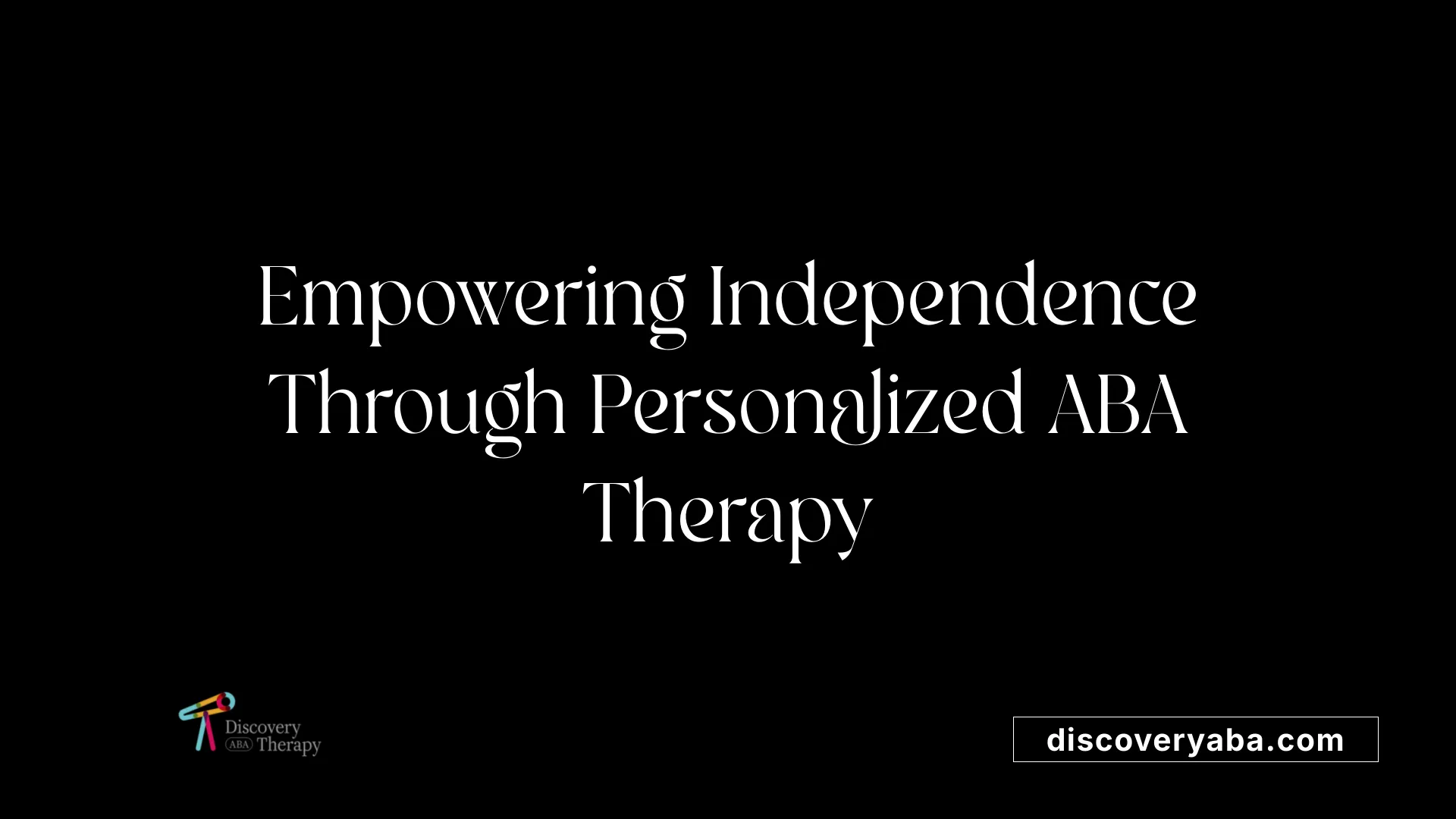How ABA Therapy Encourages Independence and Self-Sufficiency
Empowering Children with Autism through ABA Therapy

Understanding the Role of ABA Therapy
Applied Behavior Analysis (ABA) therapy is a cornerstone for many families seeking to support children with autism in developing independence and self-sufficiency. Known for its structured and evidence-based approach, ABA therapy focuses on teaching essential life skills, building confidence, and facilitating communication. But how exactly does it help children become more independent, and what evidence supports its effectiveness in fostering these critical skills? This article explores these questions and more, delving into the techniques and outcomes of ABA therapy in promoting autonomy among children with autism.
Personalized Approach for Skill Development

How Does ABA Therapy Help Children With Autism Gain Independence?
ABA therapy fosters independence in children with autism through structured and individualized teaching strategies. By breaking complex tasks into smaller, manageable steps, children learn essential daily living skills, such as grooming, dressing, and simple meal preparation. These adaptive skills are fundamental, equipping children with the tools they need to perform daily tasks confidently and autonomously.
Positive reinforcement plays a crucial role in this process. By encouraging the repetition of desirable behaviors, children not only build confidence but also develop habits that promote self-sufficiency. Each time a child successfully completes a task, they receive praise or rewards, reinforcing their ability to act independently.
Individualized ABA Therapy Plans
One of the standout features of ABA therapy is its individualized approach. Plans are tailored to each child's unique needs and adjust over time as they grow and develop. This personalized care ensures that children are continually supported in reaching developmental goals aligned with their capabilities.
Parents and caregivers play a vital role in this journey. They receive guidance and training on how to facilitate skill development at home, making the learning process consistent across different environments. This holistic approach not only focuses on self-care skills but also prioritizes social skills and communication. Evidence shows that these interventions significantly enhance children's ability to socialize and express themselves.
Key Aspects of Adaptive Skill Teaching
The teaching methods in ABA are systematic and data-driven. Progress is tracked carefully, allowing interventions to evolve as children master new skills. Some critical self-care tasks include:
Overall, the combination of individualized plans, skillful breakdown of tasks, and positive reinforcement creates a comprehensive environment that empowers children with the necessary skills to navigate their daily lives more independently.
Daily Functioning and Self-Care Mastery

How Does ABA Therapy Improve Daily Functioning for Children with Autism?
ABA therapy plays a pivotal role in enhancing daily functioning for children with autism, primarily by breaking down complex tasks into manageable steps.
Breaking Down Complex Tasks
Therapists employ strategies that simplify tasks such as brushing teeth, tying shoes, and dressing independently. Each task is divided into smaller steps, making it easier for children to learn and succeed. This breakdown supports confidence and reduces frustration, promoting a sense of accomplishment.
Developing Life Skills
Essential life skills are a major focus of ABA therapy. Children learn self-care routines including:
- Personal Hygiene: For instance, they are taught proper methods for brushing teeth and bathing.
- Meal Preparation: Skills like preparing simple meals can be introduced, enhancing their independence in the kitchen.
- Organization: Children can develop routines for organizing personal belongings, which fosters responsibility and self-reliance.
As these skills develop, children experience greater independence and overall improvement in their daily interactions.
What Role Does Parental Involvement Play?
Parental involvement is crucial in ABA therapy. Parents and caregivers are trained to reinforce skills and strategies at home, providing a continuous support system. This guidance ensures that children can practice their skills in a familiar environment, promoting better retention and application of learned behaviors.
The collaboration between therapists and families creates a tailored approach that adapts to each child's evolving needs, ensuring effective learning and enhancing mobility in daily life.
In conclusion, by fostering independence through structured, evidence-based strategies, ABA therapy significantly improves children's performance in daily living skills, making a meaningful impact on their everyday lives.
Evidence-Based Outcomes of ABA Therapy

What evidence supports the effectiveness of ABA therapy in fostering self-sufficiency for children with autism?
A growing body of research underscores the effectiveness of Applied Behavior Analysis (ABA) therapy in enhancing self-sufficiency among children with autism. A notable meta-analysis of 29 individual studies revealed moderate to high effect sizes for several critical areas:
- Communication skills: 0.650
- Expressive language: 0.742
- Adaptive behavior: 0.422
These findings suggest that while general symptoms of autism may not see significant improvement, specific improvements in communication, particularly expressive language, show promising outcomes with p-values indicating statistical significance at 0.01. This effectiveness emphasizes the role of ABA therapy in developing crucial skills that support independence.
Structured ABA programs not only promote communication but also lead to improvements in social and emotional skills. These enhancements contribute positively to the overall quality of life for children with autism. However, it's essential to note that variability exists; some studies, including analyses conducted by the Department of Defense, observed that the majority of participants exhibited no improvements. This highlights the inconsistent nature of ABA therapy's effectiveness across different individuals and settings.
In summary, while ABA therapy shows robust evidence in fostering communication and adaptive skills, continued research and individualized approach remain vital to address the varying effectiveness across different children.
Communication Skills Enrichment
How does ABA therapy enhance communication skills in children with autism?
ABA therapy enhances communication skills in children with autism by employing a variety of tailored techniques to foster both verbal and non-verbal interactions. Some effective methods include:
- Discrete Trial Training (DTT): This structured approach breaks down communication skills into smaller, teachable components, allowing children to focus on one element at a time.
- Natural Environment Teaching (NET): Unlike DTT, NET utilizes real-life situations to encourage communication in context, promoting spontaneity in language use.
In addition to these techniques, ABA therapy incorporates augmentative and alternative communication (AAC) methods. This can include:
The therapy pays particular attention to essential functions of communication, such as:
- Requesting (mands)
- Labeling (tacts)
This focus helps to expand vocabulary and improve command of sentence structure. Positive reinforcement is a crucial element, encouraging children to practice their newly acquired skills in a supported environment. Moreover, individualized assessments ensure that ABA strategies are specifically tailored to meet each child's unique needs.
Through these comprehensive methods, ABA therapy significantly enriches children's communication skills, ultimately enhancing their social interactions and quality of life.
Building Social Interaction and Problem-Solving Skills
Can ABA therapy develop social interaction skills and teach problem-solving techniques?
Yes, ABA therapy is effective for developing social interaction skills and teaching problem-solving techniques. The process starts with a detailed assessment of a child's specific social skill deficits, ensuring that intervention plans are customized to meet individual needs.
Role-playing and modeling
ABA therapy employs techniques such as role-playing and modeling to make learning interactive and engaging.
- Role-playing: Children practice different social scenarios, allowing them to experiment with various responses in a safe environment. This builds their confidence and familiarity with social interactions.
- Modeling: Therapists demonstrate appropriate social behaviors, enabling children to observe and learn effectively.
Generalization of social skills
A significant aspect of ABA therapy is ensuring that skills learned in one setting carry over to others. Positive reinforcement plays a vital role in encouraging the generalization of skills across various contexts. It helps children apply their new abilities in different environments, such as school, home, and community settings.
Furthermore, ABA therapy assists individuals in managing social anxiety and discomfort due to sensory sensitivities, which can be barriers to effective social interaction. Through systematic and supportive approaches, children can learn to navigate social situations more effectively.
In summary, ABA therapy uses a structured approach involving role-playing and reinforcement to develop social interaction skills and problem-solving techniques, contributing profoundly to a child's overall development.
The Role of Positive Reinforcement in Skill Building
Use of Positive Reinforcement
Positive reinforcement is a foundational element in Applied Behavior Analysis (ABA) therapy. This approach encourages children to repeat desirable behaviors through the systematic reward of positive actions. By reinforcing positive behaviors, children are likely to develop habits that promote self-sufficiency and independence. For example, if a child is rewarded for using polite language, they are more inclined to communicate effectively in the future.
Effective reinforcement can come in various forms, including verbal praise, stickers, or other tangible rewards that resonate with the child's interests. The goal is to establish a routine where positive outcomes follow commendable actions, thereby encouraging the repetition of these behaviors.
Building Self-Esteem and Motivation
The impact of positive reinforcement extends beyond behavior improvement; it also significantly boosts children's self-esteem. When children experience success in completing tasks like dressing or brushing their teeth, the affirmation from their therapist or caregiver reinforces their belief in their abilities. This empowerment instills a sense of accomplishment, motivating them to tackle further challenges independently.
As children observe their progress being celebrated, they develop a willingness to engage in new tasks. Moreover, incremental achievements are vital for maintaining motivation, as success in smaller, manageable steps builds confidence.
In summary, positive reinforcement not only enhances desired behaviors but also cultivates a supportive environment where children thrive in their journey toward independence.
The Importance of Early Intervention

Fostering Early Skills
Early intervention through Applied Behavior Analysis (ABA) therapy is crucial for children with autism as it promotes essential skill development. By focusing on communication and self-regulation from an early age, children can cultivate independence as they grow.
ABA therapy employs techniques such as positive reinforcement to teach adaptive skills. Children learn to perform daily tasks like brushing their teeth, dressing themselves, and preparing simple meals—all foundational skills that foster self-reliance. These early skills set the stage for improved social interactions and communication.
Setting Foundations for Independence
Creating a strong foundation for independence involves individualized ABA therapy plans tailored to each child's unique needs. These plans evolve over time, ensuring that they align with the child's developmental goals. By breaking down complex tasks into manageable steps, ABA therapists significantly enhance children's ability to complete tasks on their own.
Moreover, tracking progress through evidence-based methodologies enables adjustments to strategies as children develop. Parents and caregivers play a critical role in this process, receiving guidance and training to support their child's growth at home.
In short, initiating ABA therapy early not only boosts immediate skills but also establishes long-lasting behaviors that contribute to a child's overall independence.
Parental Involvement in ABA Therapy

Training Parents and Caregivers
Parental involvement is a cornerstone of successful ABA therapy. Training parents and caregivers equips them with essential strategies to support skill development in everyday situations. This training focuses on effective techniques like positive reinforcement, which encourages children to engage in desired behaviors regularly.
Instructors teach parents how to apply these techniques consistently at home. This consistency is crucial for reinforcing the skills learned during therapy sessions, helping children benefit from the structure of both environments.
Integrating Therapy at Home
Integrating ABA practices in the home can significantly enhance a child's learning process. By incorporating therapy strategies into daily routines—such as during mealtime or while getting dressed—parents help establish habits that promote independence.
Additionally, families are encouraged to track progress and adjustments based on their child’s unique needs. This ensures the methods remain effective and evolve with the child's development.
In summary, the collaboration between therapists and families creates a supportive atmosphere that is vital for nurturing independence, allowing children to thrive in various settings.
A Pathway to Independence
ABA therapy stands out as a comprehensive framework for supporting children with autism, offering tailored interventions that focus on developing independence and self-sufficiency. By equipping children with essential life skills, enhancing communication and social interaction, and involving families in the therapeutic process, ABA therapy lays a strong foundation for enduring positive outcomes. While the journey toward independence varies for each child, the structured approach of ABA therapy offers a hopeful path forward, empowering children to navigate their world with confidence and autonomy.
References
- Benefits of ABA Therapy for Children with Autism
- How ABA Therapy Build Independences in Daily Routines
- Empowering Autistic Children: Tips for Building Their Independence
- Ten Ways to Build Independence | Autism Speaks
- Supporting Independence and Self-Help Skills in Children with Autism
- How ABA Therapy Helps Build Daily Living Skills for Autism
- Ways ABA Therapy Can Help Improve Skills For Life
- Life skills for autism | Autism Speaks
- ABA Therapy for Social Skills: Building Connections
Does Your Child Have An Autism Diagnosis?
Learn More About How ABA Therapy Can Help
Find More Articles
Contact us
North Carolina, Nevada, Utah, Virginia
New Hampshire, Maine
Arizona, Colorado, Georgia, New Mexico, Oklahoma, Texas
.avif)




































































































